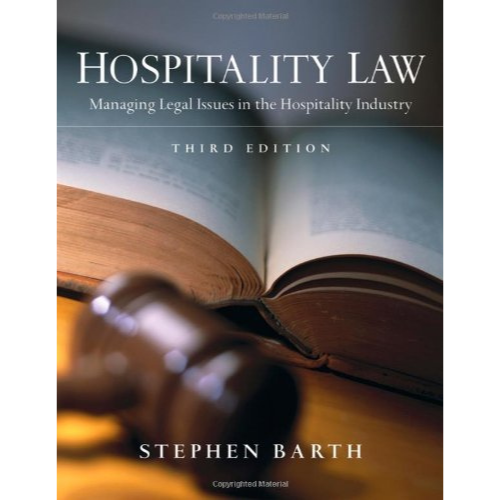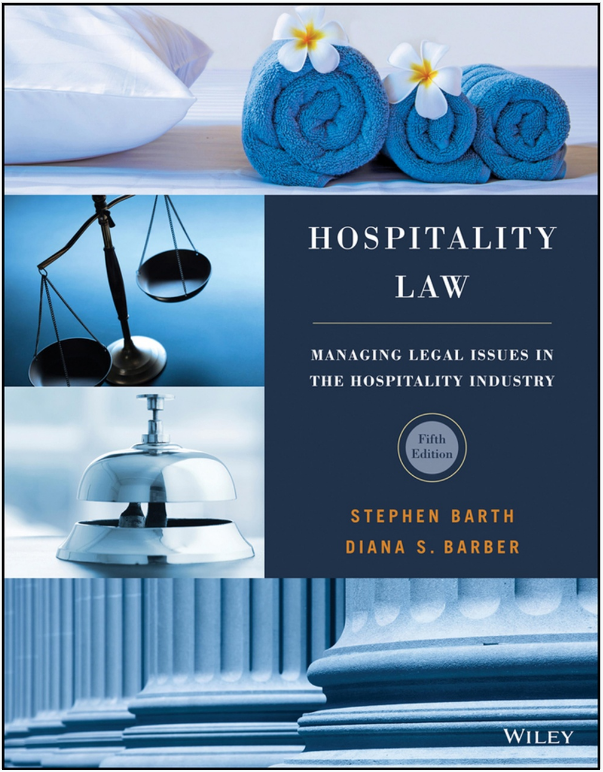Is the legal landscape of the hospitality industry a complex maze, or a navigable network of guidelines designed to ensure fair practices and protect all stakeholders? The truth lies somewhere in between, a dynamic intersection where business operations meet the evolving demands of law, requiring constant vigilance and a proactive approach.
The world of hospitality, encompassing hotels, restaurants, travel agencies, and event management, is governed by a multifaceted set of legal principles. From the moment a guest walks through the door to the final bill presentation, a series of laws and regulations are at play. These include, but are not limited to, contracts, consumer protection, employment law, health and safety regulations, and intellectual property rights. The success of a hospitality business often hinges on its ability to effectively navigate this complex terrain. This is where the understanding of hospitality management law becomes paramount.
For example, consider the intricate details of a hotel stay. The registration process, the provision of services, and even the handling of guest complaints all involve legal considerations. What happens when a guest suffers an injury on the property? Or when a dispute arises over a reservation? How is a hotel liable, and what steps can it take to mitigate risk? In fact, the understanding of hospitality law extends beyond the confines of a hotel. Travel vendors, corporate travel buyers, and event planners all face distinct legal challenges.
- Ed Murray The Ultimate Guide To Chad Michael Murrays Iconic Role
- Exploring The World Of Mkvspoint S Your Guide To The Ultimate Streaming Experience
Edward Perez's "Hospitality Management Law," published in 2021 by Cognella, Inc., serves as an excellent resource for students and professionals. It provides a comprehensive introduction to the legal concepts specific to the hospitality industry. The book is designed to equip individuals with the knowledge of business law needed to take preventative action, understand when to contact a lawyer, and successfully navigate the complexities of various legal situations that may arise in this dynamic sector. Furthermore, the text focuses on compliance and prevention, providing interactive exercises and real-world case studies. These elements help students focus on the practical application of hospitality laws, offering them the opportunity to model the skills needed for success.
Stephen C. Barth's "Managing Legal Issues in the Hospitality Industry" takes a more practical approach. Barth provides hospitality managers with the necessary tools to prevent legal problems and avoid costly litigation. It's a comprehensive text that prepares students and professionals in hospitality management to negotiate the intricate network of legal requirements. Barths book also provides insights on how to manage operations in a way that minimizes the risk of a lawsuit.
Hospitality law is not a static field. It's constantly evolving, shaped by new legislation, judicial decisions, and changes in societal norms. The historical origins of specific laws, recognizing the law's capacity for change, and adopting a proactive approach are critical elements to staying competitive and compliant in the industry. These insights and the insights from authors such as Pannet & Boella further provide more comprehensive views on hospitality law and provide insight.
- The Ultimate Football Guide Nfl News Scores And Analysis
- Rediscover Andy Griffiths The Darlings A Treasured Television Classic
The intricacies of consumer protection laws become more apparent with the increase of travel and tourism. Furthermore, in areas such as the Philippines, where tourism is vital, understanding the constitution, statutes, administrative orders, judicial decisions, and foreign tribunals is paramount for all industry professionals. The ability to navigate the nuances of each legal framework enables businesses to operate ethically and successfully. Whether its managing guest relations, ensuring employee safety, or protecting intellectual property, a solid understanding of hospitality law is a business imperative.
Clyde & Co offers a full spectrum of legal services in the sector, seamlessly integrating to meet clients' needs. They're not alone. Husch Blackwell's hospitality law team provides the same superior service to hospitality clients that their clients offer their guests, demonstrating a commitment to client success.
For those interested in further study, the hospitality management professional qualification offers students an excellent range of knowledge and skills. The qualification will offer a strong foundational understanding of legal principles, and how those principles impact the hospitality business. The qualification provides a solid understanding of risk management, consumer protection, and intellectual property rights, all essential for success in this field. Furthermore, it gives a deeper understanding of the complexities of labor laws and employment regulations within the context of hospitality.
The convergence of legal, safety, and security challenges in hospitality, travel, travel vendors, and corporate travel buyers demands special attention. This also requires a comprehensive approach to duty of care solutions. Various legislation on business organization and several international law issues such as consumer protection, product and service liability, employment and law access to the natural environment must be considered. These considerations are vital to businesses in the travel and hospitality sector.
The future of hospitality management hinges on embracing this multifaceted approach. Education, proactive compliance, and a commitment to ethical practices are no longer optional. They are fundamental to achieving success. Remaining well-informed of changing laws is critical to success.
Below is a table summarizing the key principles of hospitality management law, with references to the key sources and regulations.
| Principle | Description | Relevant Regulations/Sources | Impact on Hospitality Business |
|---|---|---|---|
| Contract Law | Governs agreements between businesses and customers, vendors, and employees. | Uniform Commercial Code (UCC), local and state contract laws. | Ensures validity of reservations, service agreements, and vendor contracts. Defines obligations and liabilities. |
| Consumer Protection | Protects guests from unfair or deceptive practices. | Federal Trade Commission (FTC) regulations, state consumer protection laws. | Requires accurate advertising, fair pricing, and proper handling of complaints. |
| Employment Law | Regulates employer-employee relationships, including hiring, firing, wages, and working conditions. | Fair Labor Standards Act (FLSA), Equal Employment Opportunity Commission (EEOC) guidelines, state labor laws. | Ensures fair treatment of employees, compliance with wage and hour laws, and prevention of discrimination. |
| Health and Safety | Mandates safe operating environments for employees and guests. | Occupational Safety and Health Administration (OSHA) regulations, local health codes, fire safety regulations. | Minimizes risks of accidents, injuries, and illnesses, protecting both staff and guests. |
| Intellectual Property | Protects trademarks, copyrights, and other intellectual assets. | Trademark Act, Copyright Act, patent laws. | Safeguards brands, creative works, and proprietary information. |
| Data Privacy | Regulates the collection, use, and protection of guest data. | General Data Protection Regulation (GDPR), California Consumer Privacy Act (CCPA), other data privacy laws. | Ensures responsible data handling, protects guest privacy, and prevents data breaches. |
| Liability and Negligence | Defines legal responsibility for harm or injury. | Common law principles of negligence, state tort laws. | Determines liability for accidents, injuries, and property damage. |
| Alcohol Regulations | Governs the sale and service of alcohol. | Local and state alcohol beverage control (ABC) laws, dram shop laws. | Ensures responsible alcohol service, prevents over-serving and related issues. |
| Accessibility Laws | Ensures equal access for people with disabilities. | Americans with Disabilities Act (ADA), local building codes. | Requires businesses to provide accommodations and remove barriers for people with disabilities. |
Here is information about a prominent figure in the field of hospitality law:
| Category | Details |
|---|---|
| Full Name | Stephen C. Barth |
| Current Position | Professor, Conrad N. Hilton College, University of Houston |
| Education | Details not readily available - please consult university resources. |
| Areas of Expertise | Hospitality Law, Leadership |
| Significant Contributions | Author of "Managing Legal Issues in the Hospitality Industry," Taught 15,000+ students, Published 150+ articles, Delivered 500+ presentations. |
| Years in Industry | 30+ years at Conrad N. Hilton College, University of Houston (as of current date) |
| Key Publications | "Managing Legal Issues in the Hospitality Industry" |
| Notable Presentations | Delivered 500+ presentations to business travel, hotel, restaurant, club, and meeting industry professionals. |
| Website | University of Houston - Conrad N. Hilton College Profile |
The constant evolution of legal principles in the hospitality sector demands that professionals maintain a proactive approach. One must be proactive to recognize these shifts. Furthermore, legal experts note that the law is constantly evolving, and what is considered absolute today may be entirely different in a few years. Thus, the hospitality manager should:
- Know the historical origins of the specific laws.
- Recognize that the law will change and evolve, primarily based on the actions of legislative bodies, and judicial decisions.
- Recognize, furthermore, that hospitality law is an active field with the capacity to change.
This underscores the importance of ongoing education and the value of seeking counsel from experienced legal professionals, particularly those specializing in hospitality law, risk management, and comprehensive duty of care solutions. Whether it involves negotiating contracts, complying with health and safety regulations, or navigating complex labor laws, understanding the legal environment is essential to building and maintaining a successful hospitality business. Being equipped with this information will help you in any hospitality business, and will also help you succeed in the hospitality industry.



Detail Author:
- Name : Wilfred Herzog
- Username : lcole
- Email : adelle.schneider@paucek.com
- Birthdate : 1982-09-08
- Address : 1935 Ransom Park Nienowchester, AK 24810
- Phone : 531-632-4196
- Company : Jacobson, Schmitt and Daniel
- Job : Poet OR Lyricist
- Bio : Error quam necessitatibus autem autem eum exercitationem voluptatibus. Soluta repudiandae voluptatem eos. Et est dolorem laborum facilis.
Socials
tiktok:
- url : https://tiktok.com/@mante2024
- username : mante2024
- bio : Repellat ea inventore aut labore veniam cumque voluptatem fugiat.
- followers : 2147
- following : 1831
facebook:
- url : https://facebook.com/yazminmante
- username : yazminmante
- bio : Amet facilis totam hic id.
- followers : 3689
- following : 1061
linkedin:
- url : https://linkedin.com/in/yazmin6080
- username : yazmin6080
- bio : Officia modi omnis quia sed quia non.
- followers : 6444
- following : 2794
instagram:
- url : https://instagram.com/mante1981
- username : mante1981
- bio : Natus sed aspernatur rerum sint et. Aut voluptatem eos cupiditate ex fugit et est.
- followers : 2151
- following : 2701
twitter:
- url : https://twitter.com/yazmin_id
- username : yazmin_id
- bio : Asperiores ducimus asperiores quod porro atque illum qui. Minus quis officia qui. Quibusdam illum et aut est cumque ipsa quaerat sunt.
- followers : 188
- following : 2033